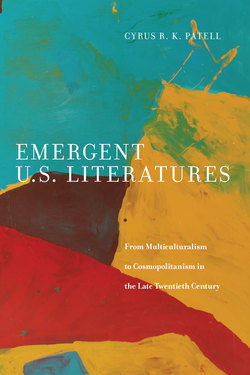Emergent U.S. Literatures

Реклама. ООО «ЛитРес», ИНН: 7719571260.
Оглавление
Cyrus Patell. Emergent U.S. Literatures
Отрывок из книги
EMERGENT U.S. LITERATURES
From Multiculturalism to Cosmopolitanism in the Late Twentieth Century
.....
Taken together, the various variants of the Cortéz corrido have been described by the critic Raymund Paredes as “a kind of Mexican American epic that pulls together the basic themes of contemporary Mexican American writing: ethnic pride, a forceful rejection of unflattering Anglo stereotypes, and, through celebration of Cortéz’s marvelous vaquero skills, an affirmation of the Mexican American’s rootedness in the Southwest.”24
In 1876 Porfirio Díaz engineered a coup and became president of Mexico. In order to help finance the industrialization of agriculture, mining, and transportation, the Díaz government encouraged investment by North Americans, who were benefiting from the expansion of the U.S. economy during the decades after the Civil War. Industrialization and in particular the building of 15,000 miles of railroad track between 1880 and 1910 transformed the Mexican economy, bringing about the decline of the communal village and forcing many peasants to become migrant workers; increasingly these workers—called braceros—traveled across the border to work in the United States. These braceros often competed with freed slaves for work, and like the Chinese, they were identified by white Americans as equivalent to blacks and treated in a similarly discriminatory fashion. In addition, they shared with Chinese sojourners the sense that they were merely transient residents of the United States: according to Américo Paredes, “the Mexican immigrant’s sense of continuing to ‘pass through’ after twenty years or more of residence in the United States contributed to his problems, since he remained a perennial visitor in a foreign country, without children born in the Uiteed States in his own way of thinking.”25 The sufferings of the bracero were also captured in the stanzas of the corrido, which began to bear titles like “Los Deportados” (“The Deported Ones”), “La Discriminación,” “Los Enganchados” (“The Work Gang”), and “Tristes Quejas de Un Bracero” (“A Bracero’s Complaint”).
.....